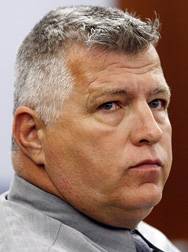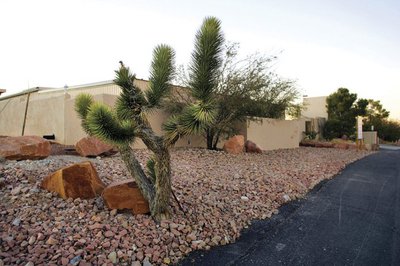Published Tuesday, Aug. 31, 2010 | 5:02 p.m.
Updated Tuesday, Aug. 31, 2010 | 6:06 p.m.

Gilbert
Sun Archives
- Gilbert CSN theft case goes to jury (8-30-2010)
- Prosecutors wrapping up theft case against ex-CSN construction chief (8-25-2010)
- Theft trial to continue for former CSN construction chief (8-14-2010)
- Gilbert case may turn on investigator’s testimony (6-2-2009)
- Judge blasts CSN police probe of alleged theft (5-30-2009)
- CSN official faces felony charges (9-26-2008)
- At CSN, two in seemingly similar jobs draw 6 figures (8-25-2008)
- Building chief returns to CSN post under a cloud (7-22-2008)
- CCSN’s, official’s methods conflict (6-22-2007)
- Raid sweeps through CCSN offices (6-14-2007)
- Contracts show conflict of interest (4-4-2007)
- Details emerge as CSN asks for money (7-3-2007)
- Flags raised, chief probed (3-26-2007)
- Gilbert blames disgruntled employees (3-26-2007)
- Sun’s probe hindered by college’s slow response (3-26-2007)
Beyond the Sun
It was more than three years ago that Bob Gilbert flatly denied to a Las Vegas Sun reporter that he had used his position as construction chief at the College of Southern Nevada to divert building materials, equipment and CSN employees to build his dream home on Mount Charleston.
No, Gilbert said, there was no wrongdoing.
No, he said, nothing was stolen from the college for his personal use at his home on 4-plus acres in Kyle Canyon.
In fact, the only complaints were those raised by disgruntled employees, and the college had looked into those and cleared him, Gilbert told then-Sun reporter Christina Littlefield in an interview published in March 2007.
But on Tuesday, a Clark County jury found him guilty of all 11 counts of theft brought against him by the Nevada attorney general’s office, which had followed up on Littlefield’s investigative series.
On Jan. 3, Gilbert, who could face years of prison time, will be sentenced by District Judge Donald Mosley.
One of Gilbert’s attorneys, Brent Bryson, declined to speculate about what kind of sentence the judge might hand Gilbert, who is free until the sentencing.
“It really depends. Given the possibilities, I don’t want to get into that because it could prejudice my client,” Bryson said outside the courtroom.
The trial began Aug. 8 with the state laying out its case against Gilbert in thefts from 2002 to 2007, when he controlled the equipment, manpower and material going in and out of the college in his position of associate vice president of facilities, operations and maintenance at CSN.
The jurors found him guilty of having pallets of cinder blocks bought by CSN delivered to his property; taking a man-lift that had disappeared from the college; stealing an electric chain hoist, a paint sprayer, 12-foot lengths of lumber, bags of thin-set mortar, door handles and door locks; stealing the use of a fork lift and a scissors lift that had been rented to CSN, and using the services of several CSN construction employees to work on his home while they were on the clock and being paid by the college.
The jury, which listened to three weeks of testimony from some 20 witnesses, heard Gilbert’s attorneys try to discredit the state’s investigation and poke holes in the state’s evidence, much of which was circumstantial.
The attorney general’s office had started its investigation when the Sun’s Littlefield was finishing her interviews in March 2007 with more than a dozen former and current college employees who said they had witnessed Gilbert misuse his position at the college.
They alleged he used CSN equipment and manpower to develop an 8,200-square-foot house, a 2,500-square-foot guesthouse, stables and a lighted basketball court.
Three days before the trial started, three of Gilbert’s co-defendants — Matthew Goins, George Casal and Thad Skinner, all of whom worked under Gilbert in CSN’s facilities management department — made agreements to plead guilty to lesser charges.
Each pleaded guilty Aug. 5 to two gross misdemeanor counts of conspiracy to commit theft. Each received a sentence that amounts to a year of informal probation.
On Monday, Chief Deputy Attorney General Conrad Hafen summed up the state’s case against Gilbert to the jury, saying it was based on “greed and the violation of the public’s trust.”
Hafen said Gilbert had “motive and he had opportunity” to divert the materials under his control for his own use.
Hafen said Gilbert’s position at the college and the fact that no one was checking up on him “doesn’t give him the right to steal ... There’s not a different standard that applies to him.”
Although Hafen put about 20 witnesses on the stand, Gilbert’s defense team relied on only one witness — Ron Remington, CSN president from 2001 to 2004.
Remington backed up Gilbert’s assertion that he had permission to have the building material and equipment on his property and that some college work was done there, including welding.
The jury didn’t buy it.
“It was a long trial,” Gilbert’s attorney Bryson said. “We certainly didn’t feel the state proved their case beyond a reasonable doubt. The jury thought otherwise. You know, that’s the way it is.”
Bryson said there are “certain areas that I’m sure will be explored on appeal” but that “under the circumstances, I thought that we presented a good case.”


Join the Discussion:
Check this out for a full explanation of our conversion to the LiveFyre commenting system and instructions on how to sign up for an account.
Full comments policy